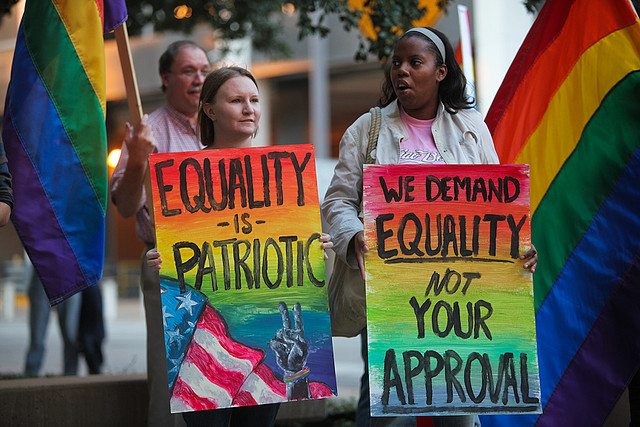To Advocate Or Not: The Answer Is Unclear For LGBT Journalists

Michael K. Lavers stumbled into LGBT news reporting at just the right time.
The year was 2003, and Massachusetts was an emerging epicenter for the latest lightning rod issue in American politics: gay marriage.
"I was in Boston, covering the first marriages in Massachusetts," said Lavers, who now writes for the Washington Blade. "A decade ago, it was hard to find stories specific to the LGBT community. Now we're not the only ones covering these issues."
Lavers understands the participatory role LGBT journalists have in shaping the discussion concerning gay rights, but unlike others, he stands with those who regard objectivity over advocacy.
"In our news stories, people are very capable of expressing their views," he said. "We're journalists, not activists."
However, high-profile journalists who decide what LGBT newsrooms report, disagree on whether it's ethical for LGBT publications to openly advocate for gay rights or not.
"We do have perspectives -- there are gaps between rights and that needs to be fixed," said Matthew Breen, the editor-in-chief of The Advocate, the largest and oldest LGBT publication in the U.S. "You don't act in an ethical vacuum. We're not at all afraid to report on the negative things that happen."
Breen, who started off as a publicist, before adopting journalism, cited the history of The Advocate as an example of LGBT news' roots in advocacy.
"The Advocate started in Los Angeles as a result of bar raids in Silver Lake during the 1960s," he said. "A lot of young queer people imagine the world as it is now, but that's not the case. There's a lineage that's proceeded anyone alive today.
"It's not a bias, but it is a perspective. It's advocacy journalism."
Similarly, Trish Bendix, managing editor of AfterEllen.com, sees her role as sometimes part journalist, part lobbyist.
"It's interesting because when I am a queer person anything I do is kind of advocating for queerness because that's what I am," Bendix said. "You don't want to be promoting a gay agenda, but you're just promoting fairness and equality.
"If that means I'm an advocate because I'm writing that we should demand reflections of us in entertainment and our media then I guess I'm an advocate."
Owned by cable channel Logo, AfterEllen.com is one of the largest lifestyle and entertainment news websites for lesbian and bisexual women.
"When we first started there wasn't enough lesbian news or entertainment news to cover just lesbian stuff," Bendix said. "That's grown so much now that we almost can't keep up. It's a terrible problem to have -- no, it's a great problem to have."
The Huffington Post had a similar "problem" in 2011 as coverage of LGBT political issues began to skyrocket.
"Huffington Post has a decidedly pro-gay marriage stance and Arianna [Huffington] wanted to embrace that and go with it," said Curtis Wong, deputy editor of Huffington Post Gay Voices. "We do highlight the triumphs and setbacks of the LGBT community, but we don't see ourselves as an advocacy publication."
The reason why may be tied to who's reading.
Wong said nearly 50 percent of Gay Voices readers are heterosexual. Another 50 percent are based outside of the U.S, he said.
"The Advocate has a gay-centric readership, but we have the main Huffington Post as our platform so a story on Gay Voices can be elevated and someone on the entertainment page can easily click to a Gay Voices story."
When Wong started writing for the Huffington Post, he assumed his LGBT stories would focus on "a little about Lady Gaga and a little about gay marriage," but he quickly realized the depth in LGBT news reporting.
"There are ordinary U.S. citizens and it's our job to highlight things that happen," Wong said. "Even if it's not glamorous."
With acceptance of gay marriage growing across the country, reporting on LGBT topics is becoming more common, but journalists covering gay news agree that more international coverage is still needed.
"The tide is shifting, but there are still other battles that need to be won," Wong said. "Think about the things that happened in Russia and what happens in the American south and Midwest -- LGBT news outlets will have to cover things like that for quite some time."
In addition to looking aboard for LGBT news, Breen believes it's time to advocate for people within the transgendered community.
"We're approaching a point that we can talk about that in a responsible way," he said. "Informed discussions -- not about genitalia. We're moving past the time when people are viewed as a curiosity."
As more athletes and actors come out, being same-gender oriented is more openly accepted in the U.S. than ever. Breen said that makes LGBT journalists' job easier and frees them up to chronicle the community in even more creative ways.
"Our goal is to describe and maintain our culture," he said. "The achievement of rights is not the end of storytelling."
Reach Contributor Christian Brown here.



